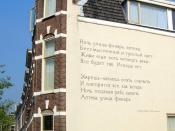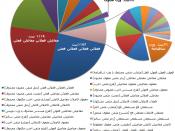The first poem by Rumi that I read was entitled "An Empty Garlic". The title threw me off at first, since it goes into this whole thing about an old woman, who the narrator is trying to discourage his friend from going after. "Tasteless fig, fold over fold, empty as dry-rotten garlic." This line finally made the title ring through the piece, which tied up a loose end for me. I kind of agree with Rumi, though how could a person desire a woman that is described by this quote? Think about how rancid food becomes once it has begun to rot. It's disgusting. Personally I don't think I could ever describe another human being as dry-rotten garlic unless that person previously antagonized me. If he really thinks of this woman that way, then he should box up those opinions and let his friend find out on his own. One man's trash is another man's treasure.
Also Rumi writes about how she has this other man trapped; yet her body is a barren wasteland. Just because her body is not great, it says nothing about the fact that she could possibly have a loving compassionate heart and a great mind. So is Rumi leaving it that love should be based on looks? I think it is more plausible that he in fact twisted his message to make that option sound worse than it would if he only made a reference to it.
"You miss the garden, because you want a small fig from a random tree." In this quote Rumi is trying to explain to his friend that he is almost wasting his love on this one woman. I understand the point Rumi is trying to make, and that is that if a person is going to miss their life...


